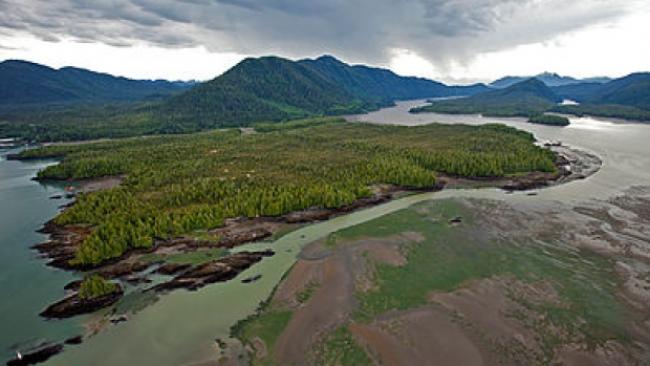Articles Menu

Just a day after royals William and Kate visited and trumpeted new protections for the Great Bear Rainforest in B.C., the federal government has announced it’s giving the greenlight to a controversial fossil fuel mega-project that threatens both an ecologically sensitive stretch of the Pacific coast and any chance Canada has of meeting its international climate commitments under the Paris Agreement.
"Indigenous and traditional knowledge will be integral to environmental monitoring of this project," said Natural Resources Minister Jim Carr in announcing the approval on the shore of the Fraser River outside a Coast Guard station near Vancouver International Airport. Carr also touted the economic benefits of moving forward with this fossil fuel export project, which is unprecedented in scale for Canada. B.C. Premier Christy Clark spoke after the federal ministers, stating that the approval proves "we can get our resources to market sustainably."
“The royals were in Bella Bella just yesterday, dedicating the Commonwealth Canopy [a forest conservation initiative]. To announce this LNG approval the day after a huge announcement about protecting the Great Bear Rainforest is a little bit counterintuitive,” Shannon McPhail, executive director of the Skeena Watershed Conservation Coalition, told Ricochet by phone from Hazelton, B.C.
The Pacific NorthWest LNG project, noted McPhail, would cut through the Great Bear Rainforest to get to the proposed terminal on Lelu Island near Prince Rupert.
“One day you’re touting how important nature is, and the next day you’re approving Canada’s single biggest climate polluter that will have drastic impacts on our second-largest run of salmon. All of this against the hereditary chiefs, by the way.”
Lelu Island, also known as Lax U’u’la, sits next to Flora Bank, a spawning ground vital to the health of the Skeena River ecosystem. Second in Canada only to the Fraser River in the number of sockeye salmon that can be spawned there, the Skeena River hosts a commercial fishery worth over $100 million per year.
“This represents yet another blatant betrayal of the promises and commitments to the Aboriginal Peoples of this country,” Grand Chief Stewart Phillip of the Union of B.C. Indian Chiefs told Ricochet by email.
“Such a decision to build such a massive LNG facility, inclusive of the necessary supporting infrastructure, would result in the imminent decimation and extinction of the Skeena River sockeye salmon fishery.”
In a submission to the project’s environmental assessment, Marc Lee of the Canadian Centre for Policy Alternatives described Pacific NorthWest LNG as a “carbon bomb.”
“In the wake [of] the Paris Agreement to curb carbon emissions and limit global warming to 1.5 degrees above pre-industrial levels, we no longer have the luxury of entertaining proposals that would substantially contribute to increased GHG emissions at home and abroad.”
The Skeena Watershed Conservation Coalition warned that the approval would have political consequences for Trudeau and the Liberals in B.C.
A yes to #PNWLNG would be a huge political risk to@JustinTrudeau. Decision coming today. Reject Petronashttp://www.PetronasMath.ca #cdnpoli
The B.C. Liberal government has ardently supported the development, with Premier Christy Clark making frequent trips abroad to promote it and other LNG projects.
Last year, an internal report documenting serious issues with Petronas’ safety and environmental record was leaked to the press. B.C. NDP opposition leader John Horgan described the report’s contents as “jaw-dropping.”
Green Party of Canada leader Elizabeth May is firmly opposed to Petronas. Federal NDP MP Niki Ashton meanwhile said on CTV’s Power Play Tuesday afternoon that the federal government had not done sufficient consultation before approving Pacific NorthWest LNG.
Petronas, for its part, has yet to announce a final investment commitment.
[For original article google Ricochet Media]